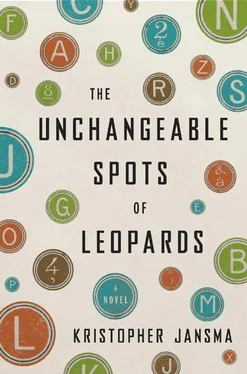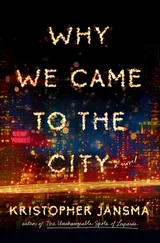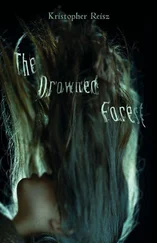“How long have you been coughing up blood?” Rose asked.
Anton lifted one cupped hand high in the air. “It will have blood! They say, blood will have blood!”
“What the hell is he saying?”
“He’s doing Macbeth,” Rose said calmly, finding her phone in a voluminous handbag. “Anton, dear, sit down. I’m going to call your parents.”
“But they’re out on the Crimean Peninsula somewhere,” I said. “We’ve got to call an ambulance. We should have called one a week ago.”
I’d let it slide this long because Anton’s nocturnal schedule wasn’t all that unusual. We had always gone through long stretches when we were each so engrossed in our writing that we barely spoke. I worked best during the harsh light of the morning, when my dreams from the night before still danced in my mind. Anton preferred to wake in blackness from nightmares and push them away slowly with sips of  and taps of his Remington hammers on ink-soaked ribbons. Now, I felt that it was little wonder he’d gotten so sick; every day he waged new campaigns in the war against his own body.
and taps of his Remington hammers on ink-soaked ribbons. Now, I felt that it was little wonder he’d gotten so sick; every day he waged new campaigns in the war against his own body.
Rose ignored me and dialed twelve digits from memory. A moment later she was connected to a palatial mansion on the Sea of Azov that I’d heard about many times but had never seen.
“Dobroye ootro, Gospodin Prishibeyev. Eto Rose. Vash syn, Anton, bolyen… ” she spoke in flawless Russian. As the one-sided conversation continued, Anton led me in a waltz around the room, pausing only briefly to mist his other sleeve with airborne blood. I wondered how contagious tuberculosis was, or if he might have gotten some kind of STD from one of his gentlemen callers.
Rose looked up, holding her hand over the receiver. “Mr. Prishibeyev says we should take him to see a Dr. Ivanych. He’s a friend of the family’s.”
Anton shouted, “Pasha! Pasha Pasha Pasha!”
I didn’t know what “Pasha” meant, but Dr. Ivan Ivanych’s name I knew from the many bottles of Lotosil, the antidepressant Anton took daily, as well as the various barbiturates and painkillers that hid farther back in Anton’s medicine cabinet.
“Great. Yeah. ‘Pasha,’” I said, coaxing Anton onto the divan to lie down. “I’ll buzz downstairs for a taxi.”
“The doctor is ice fishing at his lake house,” Rose informed me after a bit more Russian dialogue with Mr. Prishibeyev. “Somewhere upstate?”
“Waccabuc!” Anton shouted suddenly.
“He’s delirious,” I said, laying the back of my hand on Anton’s forehead. “Just tell his father we’re taking him to St. Vincent’s.”
“Kak naschyet yesli mi voz’myem yevo v blizhayshooyoo bol’nitsoo?” Rose checked the time and then said to me, “I have rehearsal for The Cherry Orchard in six hours. I can’t go upstate tonight.”
“ Nobody can go upstate tonight. None of us has a car, for one thing. For another, there’s two feet of snow on the ground!”
“Waccabuc!”
“What does that mean? Is he saying something in Russian?”
“It’s not Russian,” she said to me. Then to the phone, “Zdyes’ mnogo snyega.”
“His son is coughing up blood,” I continued. “The man is twelve time zones away. Let’s just go to the hospital.”
Rose shot me a tired look and whispered, “He says to take the Jaguar in the garage down the street. It’s for emergencies. He says his son has numerous rare conditions, and if you don’t take Anton to see Dr. Ivan Ivanych at Lake Waccabuc, then he’ll die, and then Mr. Prishibeyev will fly over here and kill you with his bare hands.”
And so it was settled. I got Anton into a too big overcoat and grabbed a mismatched wool cap and scarf for myself. Rose pushed the yellow hatbox full of manuscript pages under my arm. More than anything, what I wanted to do now was read it all again, to relive each and every detail that was now dancing around in her head.
“Masterful,” she said again, as she gave me a quick kiss good-bye.
Then, with Anton leaning heavily on my other arm, he and I trudged out into the worst storm in several years, in search of the parking garage where Anton’s father kept the for-emergencies-only Jaguar. It was times like these, which cropped up more often than they ought to, when I wondered why exactly Anton and I were friends at all.
A sleepy Pakistani attendant unearthed a camel-colored X300 from the bowels of the garage. The man seemed skeptical, double-checking Anton’s crimson Russian passport — his only form of photo ID — and jabbering in Urdu while motioning at the snow at the mouth of the garage. But I tipped him a hundred dollars out of Anton’s wallet, and the attendant reluctantly handed over the keys.
Soon Anton was dozing in the passenger’s seat and I was guiding the Jaguar through a maze of plowed streets, going the wrong way on Sixth Avenue only briefly before finding my way onto West Street. There I found four empty, freshly plowed lanes and the great frozen Hudson to the left. It was a challenge keeping the sports car under thirty miles an hour, and I could only barely see the red lights I was running. A few snowplows passed in the other lane, but otherwise I had the roads almost entirely to myself — a good thing, because I hadn’t driven since high school and was feeling the effects of the  .
.
Fumbling with the radio controls in the dark, I managed to get the tape deck on, but the only music available seemed to be a scratchy recording of Zero Mostel in Fiddler on the Roof. I hadn’t suspected Mr. Prishibeyev to be a fan of Broadway musicals.
As we passed the George Washington Bridge, I listened to Tevye sing about tradition — accompanied by Anton’s faint dream humming — and drifted back to thoughts of my novel. Titled Just Before the Gilded Age , it was about a young Southern gilder in the late 1800s in Manhattan who falls in love with the daughter of a railroad tycoon. I was going to dedicate it to Rose, as a wedding present if she gave me no other option.
We were past Fort Tryon Park and rising up out of the city. Soon I found I could not keep my eyes open another second, so I pulled off the highway, under the shelter of an overpass. I checked the time on my watch and decided to skim through the final pages of my novel until I woke up a little.
Monday the 13th. July 1863. Heartsick and thinking only of Colette Marsh, I went uptown to report for the Union draft. Colette would be married in a few days and my own life would be forfeit anyway. Why not go back down South to shoot my own cousins on some muddy battlefield? The Union had claimed victory at Gettysburg after three of the bloodiest days since the Revolution, and President Lincoln had declared every able-bodied man in New York must sign up to step onto the front lines. Fearing the wait would be epic, I clutched a well-worn Wilkie Collins novel as I rounded the corner of Third Avenue. I stepped onto Forty-seventh Street and found the 9th District Offices in flames.
Smoke poured out so thickly that it plunged the block into grayness. Men swarmed all through it, heading in every direction at once. To my left, an Irishman in faded overalls clawed a paving stone out of the street, shouting, “Aileen! I’ll see you again, Aileen!” He reeked of whiskey. It was barely past ten. He pitched the stone up and it arced right into the window of the draft office. The crash was drowned by the roar of the fire, but shattered glass still rained down on our heads as fresh plumes of blackness burst from inside.
Читать дальше

 and taps of his Remington hammers on ink-soaked ribbons. Now, I felt that it was little wonder he’d gotten so sick; every day he waged new campaigns in the war against his own body.
and taps of his Remington hammers on ink-soaked ribbons. Now, I felt that it was little wonder he’d gotten so sick; every day he waged new campaigns in the war against his own body.









